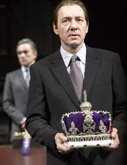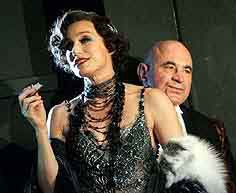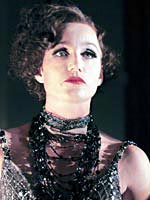What had I let myself in for, I thought, as I sat in the Lyttelton to watch nearly three and a half hours of Italian-translated drama about the banking firm Lehman Brothers who were one of the biggest casualties of the 2008 financial crisis? I had let myself in for a wonderful night of pure theatre.
Everything about the production purrs along like a Rolls-Royce, making the ride smooth as silk: Sam Mendes direction, Es Devlin's set and the three masterly performances of Simon Russell Beale, Adam Godley and Ben Miles. Apart from a few noddy moments in the first of three acts, I was fully drawn into the Lehman's world of finance, their rise in power and influence almost symbiotically matched by the growth of America as a country of risk, investment and money. Luckily the play's adapter Ben Power has reduced the original Italian playing time of five hours!
In a huge, sleek glass-walled office, a cleaner goes about his work in between cardboard archive boxes which are piled up along the windows looking out into a dark Manhattan night; slowly three figures in formal 19th Century frock coats appear from nowhere: they introduce themselves as Henry, Emmanuel and Mayer Lehman. Henry arrived in New York from Bavaria in 1844, just another Jewish immigrant from old Europe seeking a new life in the New World. He travelled down to Alabama and opened a store where he was joined by his brother Emmanuel three years later, and the youngest brother Mayer three years after that. Their store started buying and re-selling raw cotton and, so quietly and unobtrusively, an empire was born.

And so they rose in prominence and influence, every major setback in the country seemingly to play to their advantage especially during the Civil War when they shifted their offices to New York and, when the War proved cotton an unstable product, moved onto coffee and oil. When the War ended, they deftly became a bank, better to aid the South's reconstruction through Alabama State funds. Soon after the beginning of the 20th Century, the original three brothers were dead. Emmanuel's son Phillip headed up the company until his son Robert took over: by then they had helped in setting up Woolworth, Macy's, Sears & Roebuck, Pan Am, Studebaker, RCA, Haliburton and Compaq.
Robert managed to successfully steer the company through the Stock Market crash and following Great Depression but with no family to hand the firm onto at Robert's death, disruptive leadership battles in the boardroom led to the business being sold to American Express. By the time of it's regained Independence in the 1990s it was heavily involved in the shadier, more risky banking practises. Eventually it's doctored balance sheets and disastrous subprime mortgage loans forced the company into bankruptcy.

The crash is dealt with relatively swiftly as the climax of the play, it's almost like writer Stefano Massini and adapter Ben Powers felt that it didn't need too much time spent on it, they are more interested in the journey of the family to that moment and how the intentions of the three original brothers were changed into the greed and sharp practises 164 years later. Through the use of careful symbolism the play slowly takes hold, I loved the constant thread (no pun intended) running through the middle section of a tightrope walker who performed on Wall Street in the 1920s (illustrated by Simon Russell Beale!) until the day he fell off the wire in 1929, almost presaging the Crash.
Massini's play has previously been staged with large casts of actors playing all the members of the Lehman family and their associates but in Sam Mendes' marvellous stroke of genius he has just his three actors play all the roles which affords countless lightning-fast impressions of characters - some of whom you definitely wish to see more of. Of course Simon Russell Beale is pure joy, as the oldest brother Henry whose early demise from Yellow Fever gives him free rein to appear as flirty maids, Southern belles, an old rabbi, the obsessive Phillip Lehman and as Robert Lehman's hard-as-nails wife Ruth - an incidental but never-to-be-forgotten image is of him doing a very prim and demure twist to "The Beat Goes On"!

Adam Godley also triumphs in various roles but mostly as Robert Lehman, whose love of speed and recklessness almost mirrors the eventual downturn in his family's business under his watch, he also hilariously plays all the women that Philip Lehman methodically dates and rejects following a mathematical rating system and the eventual bride Carrie - he also was born to play a screaming baby!
Ben Miles loses out on the showier roles but is very good as Herbert Lehman, the censorious son of Mayer Lehman who avoided the family business and became a powerful Democratic New York politician, as well as the nasty Lewis Glucksman who rises from being a trader to running the business off the rails and into American Express' domain.
Es Devlin's large glass box set slowly revolves at each new scene to open up a new vista and is a wonderful place to stage the Lehman saga, it also manages a cunning reveal in the final scene when the three actors vanish as a crowd of supernumeraries - and what a shock after living with the three lead actors for over three hours it is to see a large group of people - as the 2008 employees crowded into the office with their cardboard boxes waiting for the bankruptcy phone call.
Jon Clark's lighting is exemplary but the real visual coup is Luke Halls' video cyclorama at the back which seamlessly moves the locations from early New York to the cotton fields and rolling rivers of the South back again to the growing, unstoppable skyline of Manhattan, as Robert Lehman's mania for hanging onto life is illustrated by Godley, Russell Beale and Miles twisting on boxes to Sonny and Cher's "The Beat Goes On" - an inspired choice - Halls' dense downtown skyline spins faster and faster out of control; a remarkable stage image. A special mention too for the musical underscoring by Candida Caldicot on a piano by the side of the stage.
In a year that has already been full of delights, THE LEHMAN TRILOGY is one of the most unexpectedly powerful; it shows again what only theatre can do: to conjure a world and a span of time by allowing your imagination to fly.















